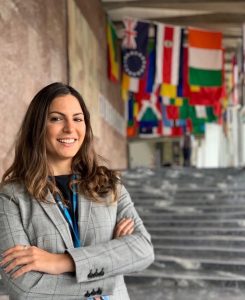An African Cookbook, a plan for prenatal nutrition care, and a WHO Study in Switzerland: for DLSPH Nutrition Students, Summer Practicums Offered a World of Opportunity
October 2/2019
By Heidi Singer
Three DLSPH students interested in influencing global nutrition policy took a step closer to their goals this summer, with practicum experiences in Geneva and Ottawa focusing on Maternal and Child Nutrition, and in Kenya researching traditional cooking.
Rim Mouhaffel, an international student who moved to Toronto two years ago to pursue her studies at DLSPH, is a strong advocate for breastfeeding. As an undergraduate in 2014, she interned in Syrian refugee camps in Lebanon, helping new mothers learn about breastfeeding and safe infant feeding practices during emergency and relief situations.

Rim Mouhaffel
“They were very discouraged – mothers would think their milk wasn’t enough,” recalls the second-year Master of Public Health Student in Nutrition and Dietetics. Infant formula and Breast-milk Substitutes were inappropriately marketed and donated as humanitarian aid, and when the supply ran out, the women couldn’t afford to buy more. She saw women in tears from joy and relief when they were able to breastfeed their babies on their own.
This past summer, Mouhaffel complemented her on-the-ground experience with a global nutrition policy placement at the World Health Organization (WHO) Headquarters in Geneva. Among her projects, she drafted the 2019 Global Breastfeeding Scorecard, which tracks countries’ progress towards global breastfeeding targets.
“My experience at the WHO was eye-opening and allowed me to understand nutrition policy from a global perspective,” she says. “My ultimate goal in life is to influence nutritional policy and have an impact on people’s health. It’s kind of a puzzle I had to build, combining my clinical, policy and global health skills.”
Another Nutrition and Dietetics student, Krizia Tatangelo, is also interested in maternal and neonatal nutrition, and also has her sights set on international research and policy. She spent the summer in Ottawa, working for a non-for-profit organization, Nutrition International, whose focus is to improve the health and nutritional status of women, children and adolescents in low-and middle-income countries.

Krizia Tatangelo
Tatangelo focused on the barriers to quality nutritional counselling during prenatal care in six countries –such as the insufficient number of trained healthcare providers, and inadequate time and space.
“I created a logic model looking at the different needs at all levels – policy, health systems and field-level,” she says. “In addition, we created a tool for health providers outlining key inputs needed to provide effective, high-quality nutrition counseling.”
The organization had already identified the provision of quality nutritional counseling as an additional demand on an already over-burdened system in the countries they worked in, such as Ethiopia and Bangladesh, Tatangelo says. “We want counseling to be an iterative process between care provider and mother, rather than didactic, so women are left feeling empowered, informed and in control of their own health”
Tatangelo researched ways to incorporate interpersonal counseling, a more interactive process in which the client defines what she wants out of the care, and both work together to develop solutions.
“Interpersonal counseling is a term not yet defined within the field of nutrition …so I had the opportunity to help formulate a definition with respect to nutrition,” and submit an abstract to international conferences in Australia and Thailand, she says.
“The next step would be to get field level experience – I would be very interested in going to Kenya,” says Tatangelo. “I would love to continue to explore global health.”
For Hannah Chan, completing a placement abroad was also a dream fulfilled. This summer, she traveled to Eldoret, Kenya to create a cookbook featuring traditional and indigenous foods in western Kenya.

Hannah Chan
“I was looking at traditional ways of growing food as well as recipes for cooking them,” she says. “The cookbook is to preserve the traditional and pre-colonial knowledge and meanings around food, and to observe how changes in agricultural practices and eating mirror nutritional and overall health in the country.”
Working with her preceptors and Moi University School of Public Health contacts, Chan visited families in communities around western Kenya and learned how to grow, harvest, and cook staples like wild greens.
“I learned a lot about African wild green leafy vegetables, many of which are bitter,” she says. “Some of them are cooked in combination with a sweeter leafy vegetable to balance out the bitter taste. It was fascinating to hear about the complexities involved with food production in Kenya and the resiliency in the communities with the passing down of that knowledge through the generations.”
She also saw the effects of colonialization up close: “I learned that maize (a staple today) is not indigenous to Kenya,” she says. “Whereas millet and sorghum are indigenous crops that are a lot more nutritionally dense and drought resistant. Being indigenous to the region, these plants are more ‘climate-smart’, meaning that they are better equipped to adapt to climate-related changes.”
The cookbook is almost finished, and Chan will be listed as co-author. “This cookbook will be used as an early conversation-starting tool as part of my supervisor’s long-term vision to improve food sovereignty, food security, and health equity in the context of sustainable food systems in western Kenya,” Chan says.
The practicum abroad was a perfect fit for her goals: “My career interest is in the intersection of environmental health and human health, with a particular focus on sustainable food systems,” says Chan, who is part of the Collaborative Specialization in Global Health. “It was very eye-opening to learn about food and health systems in different regions and communities around the world.”